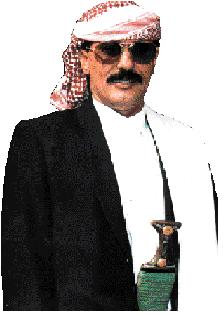
Yemen Times Publishes Excerpts of the President’s Unique and Interesting Interview with “Arrajul” Know President Ali Abdullah Saleh Up Close [Archives:2000/36/Interview]
September 4 2000
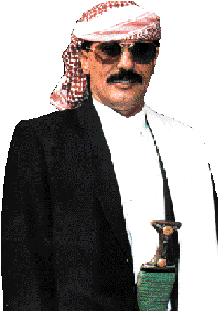
The interview which was published in the September issue of the magazine was dedicated to focusing on the president as a person, not only as a president. In a direct response to its readers request who demanded to read excerpts of the interview in Yemen Times, we publish here the excerpts of the interview with the most fascinating and interesting questions and answers.
The magazine starts with an introduction on the interview, and concluded with a statement of the interviewer Mohamed Fahd Al-Harithi by saying, “In the long interview that dragged on for more than two hours, I noticed that the President did not hesitate to answer all the questions, and when I asked about his personal life he continued to answer with confidence and never rejected any question, no matter how personal. This despite of my knowledge that he would not prefer to talk about personal issues about his life. As I ended the interview and was on my way out he told to me with a smile, ‘You chose the right moment and got a different interview.'”
Here are some excerpts from the Interview:
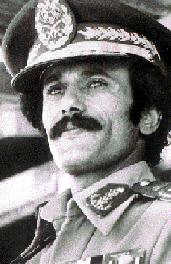
A: As you know, in my times, basic education was not available for everyone in Yemen. However, there were ” Katateebs” which are places where basic education in its simplest forms as learning Quran and reading was available. There were schools in main cities, but only the ones who had power, or who were close to the ruling family were able to study at them. I was born in a poor family which did not have enough money to support its children to study at schools, we mainly depended on shepherding. I was only able to obtain my basic education from one of the Katateebs in my village. However, from there, after I joined the armed forces, I started developing my skills and abilities, and participated in meetings in which I listened, discussed and read with and for others. All of this was in an attempt to strengthen my educational and cultural background.

A: It seems that you may have read my complete profile, and read how my personality evolved during years. My profile clearly indicates how my personality developed until I became president in July 1978. You would also realize the difficulties and challenges I went through during this time to build modern Yemen, to establish security and stability, to restore unity, to combat tribalism, and to establish good relations with neighboring countries. All of these challenges evolved my personality and guidelines. Yemen is among the most difficult countries to rule for many reasons, most important of which is the rough heritage Yemen had from its past. Apart from that, the ruler needs to understand and efficiently evaluate the internal map of Yemen.
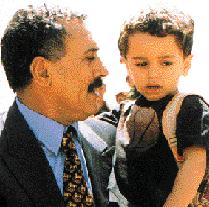
A: That was a wish come true. I always wished joining the military because I know that it develops real men. As a matter of fact, it is the factory producing strong men. Being in the military makes you feel proud and dignified.
Q: You said in a previous interview you believe that the main problem in Yemen was awareness. Hence, you explained a major problem holding Yemen back from development and progress. What is the solution to this problem in your view?
A: Lack of awareness is not unique to Yemen, but is rather a major problem in the Arab and developing world. Raising the level of awareness needs the development of media and cultural organs, along with efficient role of education. There would be no awareness without education and there would be no awareness under the current circumstances of high illiteracy rate. This requires a lot of efforts, and if there is awareness, it would help develop the country, strengthen stability, and eliminate crimes and any other negative aspects in society. This can only be done through spreading awareness, which is the cornerstone for any progress and development of any nation.
Q: You stressed in several interviews and press statements that you did not wish your son Ahmed to succeed you, and that you will not support him directly or indirectly. Why are you so strict in this regard?
A: This issue has been repeated several times, and for us in Yemen, we did clarify our viewpoint many times. However, the press seems to have not found the chance to talk about it except with the President. Anyway, we have said more than once that Ahmed Ali Abdullah Saleh is a normal Yemeni citizen who has the right to fulfill all the duties mentioned in the Constitution as any other citizen. The system in Yemen is a democratic republican system,
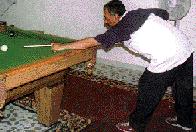
Q: Mr. President.. Many people know your political aspects as a political leader, but do they know about your other aspects as a father and a person responsible for a family?
A: I am a father of six boys and ten girls. I have married two women, and I had a third wife who died several years ago in a traffic accident. She was the mother of my eldest son, Ahmed.
Q: Do you spend enough time with your family?
A: After the official working hours, and after stopping receiving any external telephone calls, I tend to spend sometime with my family and children, either at lunch or dinner, and sometimes during holidays.
Q: When and where do you spend your vacation?
A: I have no vacations abroad. I spend my vacations in the country either at work or in solving issues that concern the state or civilians. I spend the rest of my spare time with my children or having a rest. I consider anything accomplished and complete – such as water and electricity projects, building new hospitals or any other national accomplishments such as building the military and strengthening security and stability, hence granting the public the peace of mind – a great delightful vacation. Such activities are for me a much better alternative than spending my vacation abroad, as for me accomplishments are also a great vacation.
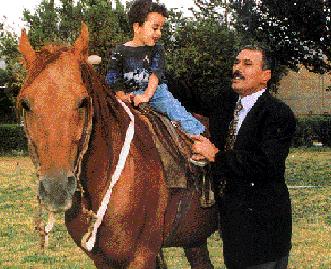
A: Yes indeed. I do get enough time for such activities, especially on Thursdays and Fridays, during which I watch TV and follow satellite channels. I do tend to watch the news and political, cultural, and historical programs that deserve watching.
Q: What about sports activities? Do you get the time to do some sports?
A: I exercise a lot in a continuous manner whenever I have time for it. I enjoy playing snooker and bowling and I also enjoy swimming. The most suitable time for me to do some sports is between 15:30 and 19:00.
Q: What are the newspapers and magazines you usually read?
A: I read all the Yemeni newspapers and follow up what Arab and International newspapers publish. It is important for any politician to follow what is being published in the press, otherwise he would be isolating himself from the world around him.
Q: I have heard that you are currently enrolled in a computer training course. Is that true?
A: Not exactly. However, I do have a computer on which I follow news and newspapers through the Internet. But I do not type on computers, and I am not good at that.
Q: How do you spend your weekend, and what are the major activities you do during your vacations?
A: Even though Thursday is an official holiday, I usually receive guests and pay visits to some military units in a slightly less condensed matter as during weekdays. On Fridays however, I sleep until 11:00 and on many occasions I wake up and leave for the Friday prayer. I then come back to have lunch and spend some time with my friends and guests in ” Maqyal” -(A Qat chewing session in which people gather to chat about various things)- and exchange ideas and listen to news either about the Arab-Israeli conflict or issues in relation to Jerusalem, Chechnya, or Russia, or about other various events happening in the world.
Q: What is the nature of the “Maqyal” in the Yemeni society?
A: The word ” Maqyal” may have been derived from the word “Qaylula” (siesta) or the afternoon nap. In Yemen, a “Maqyal” is a daily occasion on which relatives, friends, and guests meet. In Yemen, “Maqyal” has become strongly linked to Qat, and its starting time is from 13:00, and is most commonly experienced in warm areas. The “Maqyal” is mostly a more social and cultural gathering in the form of a mini-parliament open for everyone to discuss and exchange ideas and views in relation to everything of interest and concern for the people’s issues and views.
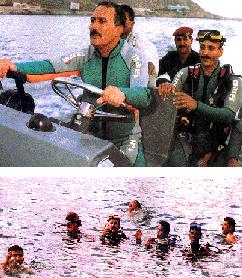
A: Yes, when awareness is spread about, and when there are sufficient jobs and activities to kill unemployment and leisure hours, the habit of chewing Qat would slowly cease to exist. The habit of chewing Qat is truly a negative habit on both financial and personal health levels besides its damage to economy and productivity. But it is extremely difficult to ban this habit with a political decision, but it should be done through spreading awareness and persuading people of its dangers. We had great experiences in Yemen, and once awareness about a certain phenomenon, much could be accomplished. As an example, when there were cleanliness campaigns in the cities of Yemen, and once citizens started realizing the leadership and government are serious about it, they have started interacting with the efforts and a good level of cleanliness was achieved. Other things were also achievable once determination and awareness were available.
Q: What is the picture you are drawing for the future of the Yemeni citizen? What is the picture you are visualizing that you always hope for and think of?
A: What I always wish and hope for the Yemeni citizen is his happiness, peace of mind, and confidence over making ends meet and in his stability, security, education, and culture. It is important for me to see the country and Yemeni people as developed and civilized as other world developed nations. My desire is to see Yemen, which is a country with a great civilization and glory, catching up with the modern civilization and at the same time keeping its own traditions and rich heritage.
Q: When do you feel to be happy and get personal satisfaction?
A: What makes me satisfied and happy at a personal level is everything I give to my country and nation and to any person, and every useful action I take makes me feel happy. Even when I answer the questions of a journalist, and provide perfect answers I also feel happy.
Q: Have you ever been through a time when you felt extremely worried?
A: Of course I have. The times of worries I went through were linked to national issues related to the country. The most difficult moments of my times of worries were over unity, how to establish it, and how to maintain it.
Q: I have heard a lot of comments
saying that the elegance of the Yemeni President were quite noticeable and always distinguished. What is the secret behind this?
A: I do not exaggerate in elegance, and I carry on my life with easiness. Perhaps the factor of age plays a role in that, as when a person crosses the 50 or 60-year mark, it would be quite difficult for any elegant suite to cover the true age and the fact of crawling towards total senility.
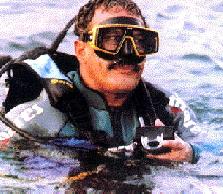
A: The historical events were the reason behind making me the president of Yemen. I never had the ambition to be a President. Perhaps any person during his childhood and youth age may dream of becoming a leader, a kind, a minister, an official, or a president. I believe every young person during his early stages of life would wish for such a position.
Q: Now that you have achieved great accomplishments, do you hope that you would leave your responsibilities -retire political life- and turn to your personal life?
A: I hope that after all the great achievements have been accomplished, and after the end of the presidential period, that there would be political personalities from all the different political parties ready to be nominated for the coming presidential elections. I wish that by then, I would not be a candidate so that I would leave the presidential post and take my time in writing my memoirs and whatever I went through during my political life. This is because what is important for me is to establish the mechanism of the peaceful transfer of power, and to see the time when the Yemeni people are used to elect their president with total freedom through voting polls.
Q: Have you written anything in your diary yet? And are you keeping any documents to be used in the diary?
A: Of course I have such documents. However, I have not started writing my diary until now. One day, with the grace of Allah, I will be writing down everything in my diary. People have read or heard about many things, but there are many things about me that are of great importance that they need to know about myself.
——
[archive-e:36-v:2000-y:2000-d:2000-09-04-p:./2000/iss36/intrview.htm]


